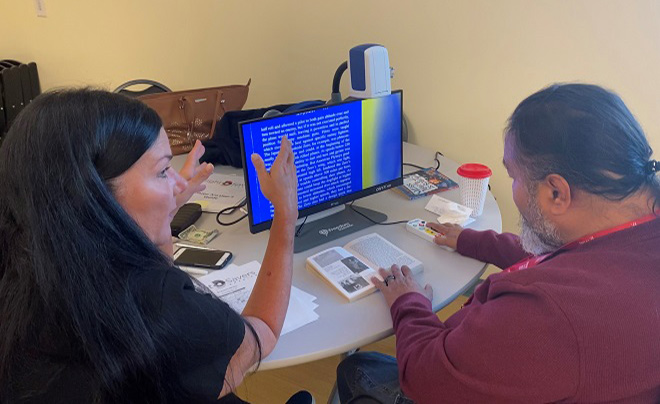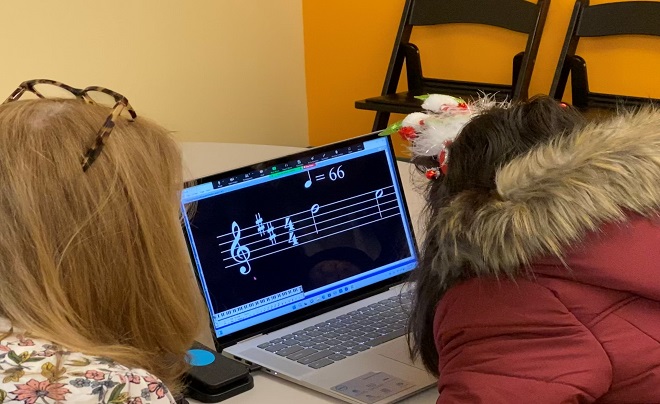Children with Severe Visual Impairment Receive Gift of Life-Changing High-Tech Vision Aids at RSO
 This winter, 11 children and adults with severe visual impairments received visually assistive technology from Sight Savers America (SSA) at the UIW Rosenberg School of Optometry (RSO) Bowden Eye Care Clinic. SSA is a non-profit organization that helps to facilitate eye care and provides low vision and blind equipment, along with any necessary equipment training, in 16 states across the nation.
This winter, 11 children and adults with severe visual impairments received visually assistive technology from Sight Savers America (SSA) at the UIW Rosenberg School of Optometry (RSO) Bowden Eye Care Clinic. SSA is a non-profit organization that helps to facilitate eye care and provides low vision and blind equipment, along with any necessary equipment training, in 16 states across the nation.
Dr. Stephanie Schmiedecke Barbieri, professor and Chief of Low Vision Services at RSO, attended the event as both an educator and a partner with SSA.
Dr. Schmiedecke is an expert in low vision, which refers to optical impairment that causes functional loss. Her background includes a degree in low vision rehabilitation, the development of low vision programs and the low vision rehabilitation residency at RSO. She also holds memberships in both state and national low vision committees.
 During her own residency, her mentor and director recommended that she look into SSA and opportunities to work with them, due to her level of experience and expertise. Since 2013, RSO and SSA have partnered by using grant sponsorships to host vision clinics multiple times a year, where helpful vision devices are distributed to those in need. Dr. Schmiedecke personally identifies children and adults in need of help and refers them to SSA. If they qualify, these patients receive this equipment at no cost at the clinics that have been based at RSO.
During her own residency, her mentor and director recommended that she look into SSA and opportunities to work with them, due to her level of experience and expertise. Since 2013, RSO and SSA have partnered by using grant sponsorships to host vision clinics multiple times a year, where helpful vision devices are distributed to those in need. Dr. Schmiedecke personally identifies children and adults in need of help and refers them to SSA. If they qualify, these patients receive this equipment at no cost at the clinics that have been based at RSO.
These clinics have helped to aid dozens of patients by providing equipment such as magnifiers, closed circuit television and text-to-speech devices. Dr. Schmiedecke recalls patients which included a young girl who wanted the ability to read sheet music so she could learn how to play the flute, a teenager who wanted the simple pleasure of painting her fingernails, and a double amputee who had the biggest smile on his face upon being able to finally see clearly. As a low vision expert, she appreciates that these events bring hope to those who feel hopeless. As an educator, she hopes that her students see the impact of these clinics and discover a passion in the specialty of low vision.
 There is notably a significant number of people living with low vision in the U.S., just as many as the number of people living with diabetes according to Dr. Schmiedecke. Yet, this health condition isn’t talked about as often. In addition, Dr. Schmiedecke says the limited number of low vision specialists in the area make finding appropriate care a challenge to those who need it.
There is notably a significant number of people living with low vision in the U.S., just as many as the number of people living with diabetes according to Dr. Schmiedecke. Yet, this health condition isn’t talked about as often. In addition, Dr. Schmiedecke says the limited number of low vision specialists in the area make finding appropriate care a challenge to those who need it.
“There aren't a lot of us (Low Vision specialists) around in San Antonio,” noted Dr. Schmiedecke. “The only ones we have are the ones at the school and then two other doctors out in the community for 2 million people (in need). There’s one in Austin and there are two in Houston.”
She is proud to say that one of her students recently did her residency and is now working to treat patients in the Rio Grande Valley. Contributing a meaningful addition to the world to low vision treatment.
“I have 68 to 70 students and if I can just get one or two of them to have enough passion to do this, then I feel like I've done the job of passing it on,” reflected Dr. Schmiedecke. “That's why I came here to RSO and have been here for 12 years.”

